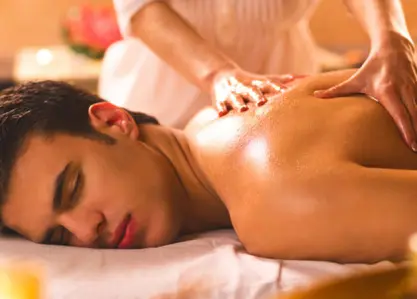Abhyanga
Abhyanga is an ancient Ayurvedic practice that involves a full-body massage using warm oil. The word "abhyanga" is derived from Sanskrit, with "abhi" meaning "to rub" and "anga" meaning "limb" or "body." Abhyanga is considered a form of self-care and is often used to promote relaxation, rejuvenation, and overall well-being.
During an abhyanga massage, warm oil, typically herbal-infused, is applied to the entire body. The oil is gently massaged into the skin using long, rhythmic strokes. The massage typically starts at the scalp and then moves down to the face, neck, shoulders, arms, hands, torso, legs, and feet. The therapist may also pay special attention to certain areas or energy points on the body, such as the marma points in Ayurveda.
Abhyanga is believed to have numerous benefits, both for the physical body and the mind. It is thought to help improve circulation, nourish the skin, promote detoxification, relax the muscles, and calm the nervous system. It is also believed to balance the doshas (Vata, Pitta, and Kapha) in Ayurveda, which are considered the fundamental energies governing the body and mind.
In addition to its physical benefits, abhyanga is often seen as a deeply soothing and nurturing experience. It can help reduce stress, promote a sense of grounding and balance, and provide a space for self-care and self-awareness. The type of oil used for abhyanga may vary depending on an individual's dosha type or specific needs.
Abhyanga can be performed by a trained Ayurvedic therapist or practiced as self-massage. If you are interested in experiencing abhyanga, it is recommended to seek guidance from an Ayurvedic practitioner or massage therapist trained in Ayurvedic techniques to ensure proper technique, oil selection, and overall safety.
